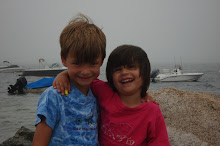 I just finished this book. I don't tend to read this type of memoir that has at its core childhood sexual abuse, for a bunch of reasons. The fact that I started and finished this one in less than 24 hours must say something about the writing or the subject, though. I'm not sure what. I think the book does a good job of skirting the prurience that you might expect from this subject. While it is the story of a woman who goes into treatment for what she calls sex addiction, the story is always about the emotional struggle, it is always about her need for sexual attention from men, rather than the encounters themselves. In fact, the strongest scenes are the ones where the narrator puts us in the room with her marriage. The scenes between the secretive wife and the husband who has no clue about the affairs and yet is filled with anger and disappointment about their marriage are wrenching.
I just finished this book. I don't tend to read this type of memoir that has at its core childhood sexual abuse, for a bunch of reasons. The fact that I started and finished this one in less than 24 hours must say something about the writing or the subject, though. I'm not sure what. I think the book does a good job of skirting the prurience that you might expect from this subject. While it is the story of a woman who goes into treatment for what she calls sex addiction, the story is always about the emotional struggle, it is always about her need for sexual attention from men, rather than the encounters themselves. In fact, the strongest scenes are the ones where the narrator puts us in the room with her marriage. The scenes between the secretive wife and the husband who has no clue about the affairs and yet is filled with anger and disappointment about their marriage are wrenching. There is also a long section of the book in which the narrator details her involvement as a teenager with a much older married man and how she tries to become part of his family, or to think of herself as such, after his wife invites her to stay for dinner. She writes, "I imagine they will urge me to move out of my dorm. They will ask me to live here. I can type Forrest's correspondence. I can place my necklaces in the Chinese jewelry box. I can help Shirley cook dinner. I can be Scottie's sister. I can be Forrest's..." Of course all of this loops back to her own father who molested her. Yet, the scene continues through dinner with Forrest's wife and son. It really shows the dynamic she's struggling with and how it is replicated in so many families, not just the ones with abused daughters.
I have more trouble with some of the recovery speak in the book, which is a necessity, I suppose. Or the remembered details of emotional transformation. She writes in a later chapter, "Why does this territory labeled "body," this geography of skin, cause such distraction and destruction? How can this same body now live in a hospital while it attempts to become a different body, learn different routines and movements?" This type of therapy speak, when it popped up, left me flat, as though the real audience of the book is people who are also in recovery for this addiction, and not general readers.
The author, Sue William Silverman, also teaches writing, and I found her theories about memoir to be fascinating, in that they reveal how to tell ultra personal stories like this one. Basically, she feels that there are two voices at work in this type of memoir. One is the voice of innocence, the voice that relates the "what" of what happened. The details emerge in cinematic form. The other voice is the voice of experience, that voice that looks back on the experience to say what it really meant. She has five stages of this that move from pure description to the emotional experience of what happened to the fully developed, reflective narrator of experience. Not every story hits every one of these five notes, but it's a really interesting theory of how to effectively layer pure experience alongside reflection.











